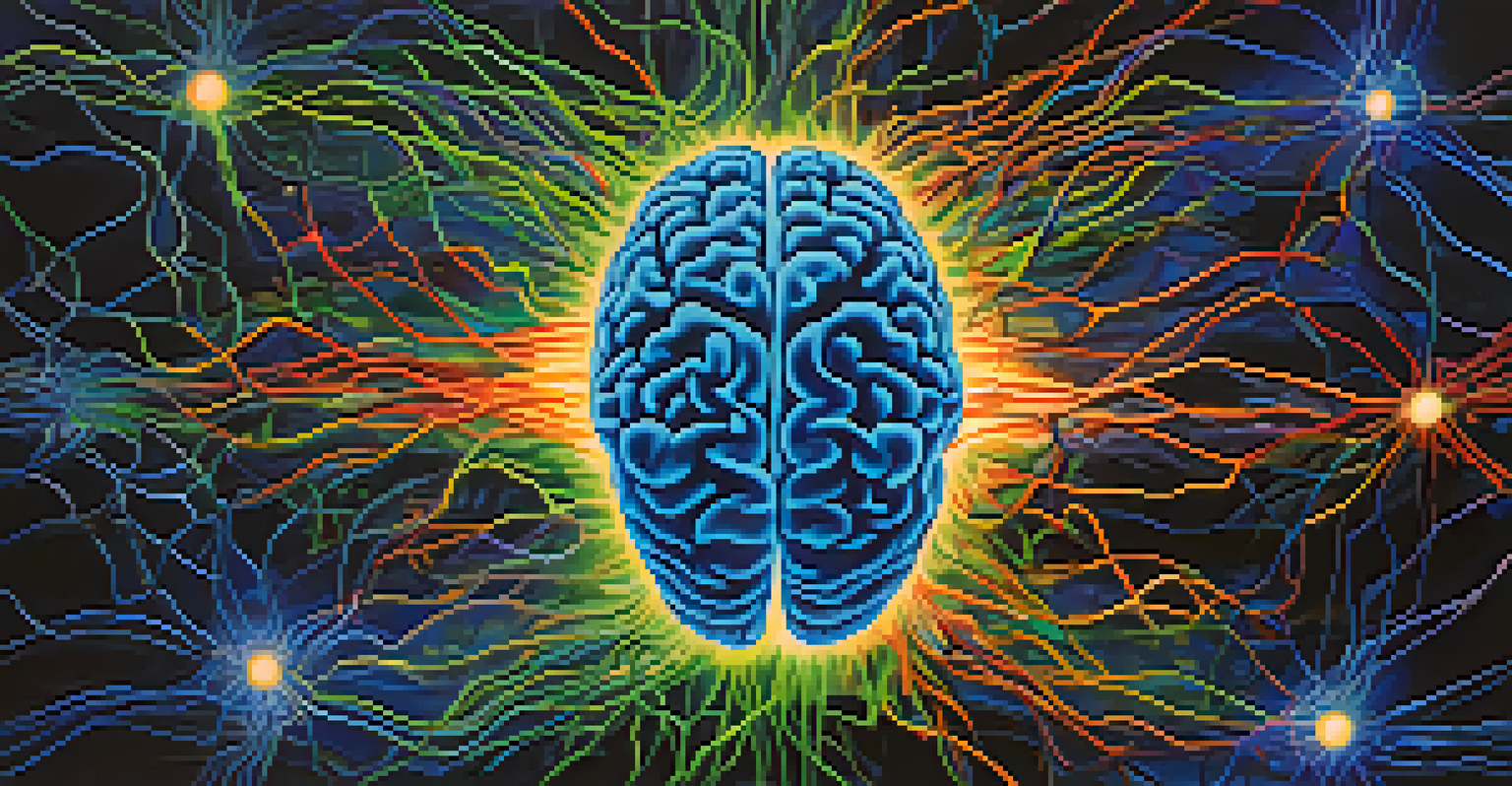The Impact of Psychedelics on Existential Distress in Patients

Understanding Existential Distress in Patients
Existential distress is a profound sense of anxiety or despair that often arises when individuals confront life’s ultimate questions, such as the meaning of existence, death, and identity. Many patients, especially those dealing with terminal illnesses, grapple with these feelings, leading to a diminished quality of life. This distress can manifest in various ways, including depression, anxiety, and a sense of hopelessness, making it crucial to explore effective interventions.
Psychedelics can help us heal our deepest wounds, allowing us to confront the fears that keep us trapped in a cycle of despair.
For many, traditional therapies may not fully address the deep-rooted nature of this pain. While talk therapy can offer some relief, it often falls short when patients seek answers to life’s bigger questions. This gap in treatment has led researchers to investigate alternative approaches, including the use of psychedelics, which have shown promise in recent studies.
The idea of using psychedelics to address existential distress is not just about altering perceptions; it’s about facilitating profound experiences that can lead to insights, emotional release, and a reconnection with life. Understanding this context sets the stage for examining how substances like psilocybin and MDMA can play a role in therapeutic settings.
How Psychedelics Work on the Brain
Psychedelics, such as psilocybin and LSD, interact with serotonin receptors in the brain, particularly the 5-HT2A receptor. This interaction leads to altered states of consciousness, often resulting in enhanced emotional processing and introspection. By 'resetting' the default mode network, which is involved in self-referential thoughts, these substances can help break the cycle of negative thinking that often accompanies existential distress.

In essence, psychedelics can create a unique mental space where patients may confront their fears, traumas, and unresolved issues in a supportive environment. This process can lead to significant breakthroughs, allowing individuals to reassess their beliefs about life, death, and their place in the world. These insights can be incredibly healing, fostering a sense of peace and acceptance.
Existential Distress Affects Patients
Many patients, especially those with terminal illnesses, experience profound anxiety and despair related to life's ultimate questions.
Moreover, studies suggest that the impact of psychedelics can extend beyond the immediate experience, promoting lasting changes in attitudes and behaviors. This long-term effect is particularly important for patients struggling with existential questions, as it can provide them with tools to navigate their distress more effectively.
Clinical Research on Psychedelics and Existential Distress
Recent clinical trials have indicated that psychedelics can significantly reduce symptoms of existential distress in patients with terminal illnesses. For example, studies involving psilocybin have shown marked improvements in anxiety and depression, with participants reporting a greater sense of peace and understanding regarding their condition. These findings are not just anecdotal; they are backed by rigorous scientific research that highlights the potential therapeutic benefits of these substances.
The experience of confronting existential questions can lead to profound insights and a renewed sense of purpose.
In one notable study, patients who received psilocybin experienced a profound shift in their perspective on life and death, leading to decreased anxiety about their impending mortality. This shift often results in improved emotional well-being, allowing patients to engage more meaningfully with their loved ones and their own life narratives. Such outcomes are invaluable in palliative care settings.
The growing body of research emphasizes the need for further exploration into the use of psychedelics as a viable treatment for existential distress. As more studies are conducted, the medical community is beginning to recognize the potential of these substances to provide comfort and clarity in the face of life's most challenging questions.
Therapeutic Setting: Creating a Safe Space
To harness the therapeutic potential of psychedelics, it is essential to create a safe and supportive environment for patients. This involves not only the physical setting but also the emotional and psychological preparation of the individual. Trained therapists play a crucial role in this process, guiding patients through their experiences and helping them integrate the insights gained during their sessions.
The importance of set and setting cannot be overstated in psychedelic therapy. A calm, comfortable space with trusted individuals can lead to more profound experiences and positive outcomes. This careful preparation helps minimize the risks associated with psychedelic use, ensuring that patients feel secure enough to explore their innermost thoughts and feelings.
Psychedelics Offer New Insights
Research suggests that psychedelics can facilitate emotional breakthroughs and lasting changes in attitudes towards life and death.
Moreover, post-session integration is a vital component of the therapeutic process. Patients are encouraged to discuss their experiences, helping them make sense of what they encountered during their psychedelic journey. This reflection can lead to deeper understanding and continued healing long after the session has ended.
Potential Risks and Considerations
While the promise of psychedelics in treating existential distress is exciting, it is essential to acknowledge the potential risks involved. Not everyone is suited for psychedelic therapy; individuals with certain mental health conditions, such as schizophrenia or severe bipolar disorder, may experience exacerbated symptoms. Therefore, thorough psychological evaluations are critical before embarking on such treatments.
Additionally, the setting in which psychedelics are administered plays a significant role in the overall experience. An uncontrolled or unsafe environment can lead to negative experiences or 'bad trips,' which can further traumatize vulnerable patients. Careful monitoring and support are essential throughout the process to mitigate such risks.
Despite these concerns, ongoing research continues to refine our understanding of who may benefit most from psychedelic therapy. As the field evolves, developing clear guidelines and protocols will help ensure that these treatments are both safe and effective for those in need.
Integrating Psychedelics with Traditional Therapies
The integration of psychedelics into existing therapeutic frameworks offers a promising avenue for treating existential distress. Rather than replacing traditional therapies, psychedelics can complement them, providing patients with deeper insights and emotional breakthroughs that enhance their overall therapeutic journey. This approach encourages a more holistic understanding of mental health.
For instance, pairing psychedelic experiences with cognitive behavioral therapy (CBT) can help patients process and apply the insights gained during their sessions. This combination allows individuals to confront their fears and anxieties more effectively, fostering resilience in the face of life’s challenges. The synergy between these modalities can lead to transformative changes.
Creating Safe Therapeutic Spaces
A supportive environment and trained therapists are crucial for safely guiding patients through psychedelic experiences.
Moreover, as the stigma surrounding psychedelics continues to diminish, more therapists are exploring how to incorporate these substances into their practice. This shift may pave the way for innovative treatment options that prioritize patient well-being and foster a deeper understanding of one’s existence.
The Future of Psychedelic Therapy in Mental Health
Looking ahead, the future of psychedelic therapy in addressing existential distress appears promising. As research expands and more clinical trials are conducted, we may see a broader acceptance of these substances within the mental health community. This could lead to more robust treatment options for patients struggling with profound existential questions and fears.
Moreover, as public perception shifts and policymakers consider the therapeutic potential of psychedelics, we may witness a transformation in regulatory frameworks. Such changes could facilitate access to these treatments, allowing more patients to benefit from their unique properties. The potential for psychedelics to be integrated into mainstream mental health care is an exciting prospect.

Ultimately, the journey toward understanding and implementing psychedelics in therapeutic settings is just beginning. As we continue to explore the intersection of these substances and existential distress, we may uncover new pathways to healing that empower individuals to navigate their lives with greater clarity and peace.